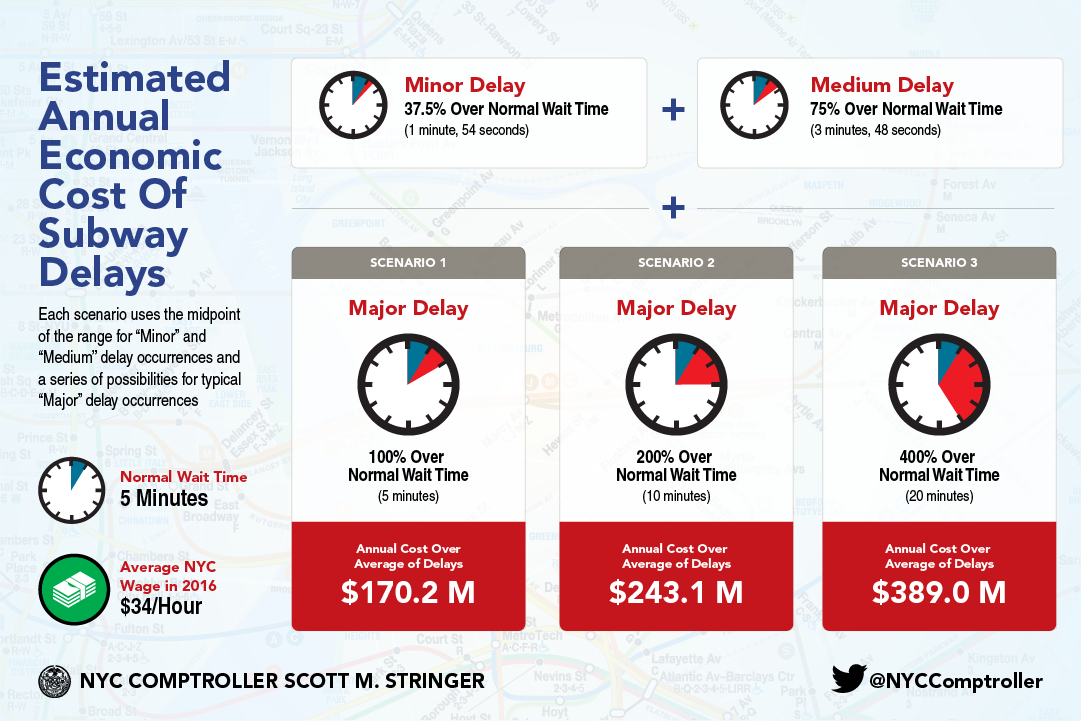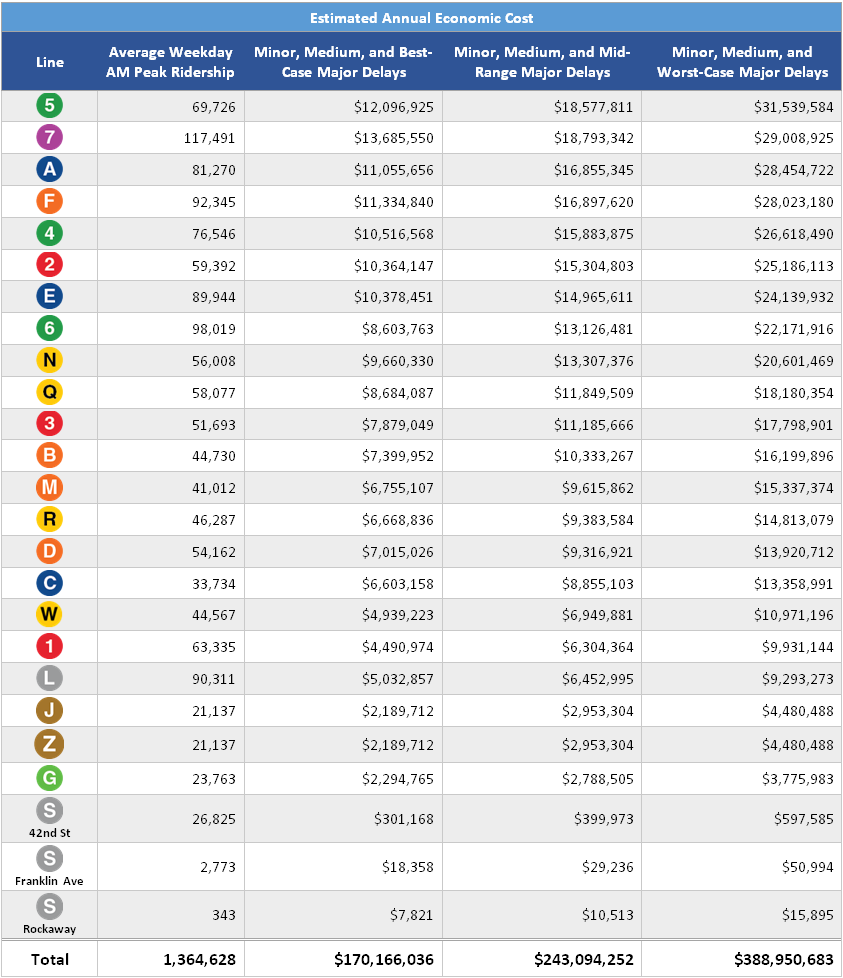Comptroller Stringer: Subway Delays Hit City Economy, Cost Workers and Business Nearly $400 Million Each Year

"Worst Offenders" are the 5, A, 7, F, and 4 trains — with total annual costs reaching $140 million
Comptroller Stringer calls for all hands on deck approach as the 'Summer of Hell' threatens to become a 'Fall of Frustration' for commuters
(New York, NY) — As subway delays continue to frustrate New Yorkers and disrupt commutes, Comptroller Stringer today released a first-of-its-kind economic analysis that shows New York City’s economy takes a direct hit from subway delays, which cost workers and businesses in the hundreds of millions annually. According to the analysis, the annual economic cost of stalled trains could reach nearly $400 million dollars under worst-case scenarios, with delays on the 5, A, 7, F, and 4 subway trains being the most costly, topping out at a whopping $140 million a year combined. The new economic analysis follows a survey of straphangers conducted by the Comptroller’s Office that highlights the human impact of subway delays, which showed that 74% of respondents reported being late to a work meeting due to subway delays, while 65% reported being late to pick up or drop off a child and 13% reported losing wages.
The analysis explores three different scenarios that provide a range of costs. Using data on ridership, delays, and wait times for trains from the MTA and average hourly wage data from the Bureau of Labor Statistics, the analysis examines how delays impact New York City’s economy. The analysis estimates that — depending on the length of delays and the assumptions made — the annual economic impact to New York City could range from $170.2 million up to $389 million dollars.
“Several months ago, we did a comprehensive citywide survey to understand the human impacts of subway delays. Now, we understand the economic costs of the crisis underground. What these new numbers show is that the cost of inaction is greater than the cost of action; that subway delays take a massive toll on our economy. We need to fix our subways both to improve quality of life and our economy. This isn’t a choice – it’s a must,” Comptroller Scott M. Stringer said. “There is no question our subways are in crisis after decades of underinvestment and inaction. With the ‘Summer of Hell’ fading into what could be a ‘Fall of Frustration,’ every level of government needs to step up. Our subway system is the backbone to our economy. That means with every delay, there aren’t just lives affected – there’s an economic consequence.”
| Systemwide “Major” Delay average | Economic Cost |
| 5 minutes | $170.2 million |
| 10 minutes | $243.1 million |
| 20 minutes | $389.0 million |
By MTA definitions, a train is considered to have a “minor” delay if it arrives 25% to 50% behind schedule, a “medium” delay if it arrives 50% to 100% behind schedule, and a “major” delay if it is more than 100% behind schedule. The Comptroller’s analysis uses the midpoint of the range of wait time delays for minor and medium delays (37.5% and 75% behind schedule, respectively, or on average roughly 2 and 4 minutes), and three different scenarios for major delays equal to 100%, 200%, and 400% behind schedule — or on average 5, 10, and 20 minutes — and yields a low-end estimate of $170.2 million per year and a high end of $389 million.
The Comptroller’s Office also released a line-by-line economic analysis to help New Yorkers understand which lines may end up costing our economy the most activity.
According to the data, the five subway lines that most negatively impacted economic activity include:
- The 5 train, with estimated impacts ranging from $12.1 million to $31.5 million annually;
- The 7 train, with estimated impacts ranging from $13.7 million to $29 million annually;
- The A train, with estimated impacts ranging from $11.1 million to $28.5 million annually;
- The F train, with estimated impacts ranging from $11.3 million to $28 million annually;
- The 4 train, with estimated impacts ranging from $10.5 million to $26.6 million annually.
Together, the worst-case economic impact of delays on these five lines tops $140 million.

In July 2017, Comptroller Stringer released the results of a survey that highlighted the human impacts of subway delays. According to the survey:
- 74% of respondents reported being late to a work meeting due to subway delays;
- 65% reported being late to pick up or drop off a child due to subway delays;
- 29% said they had been late to a doctor’s appointment due to subway delays;
- 13% reported losing wages due to subway delays; and
- 2% said they had been fired from a job due to subway delays.
###